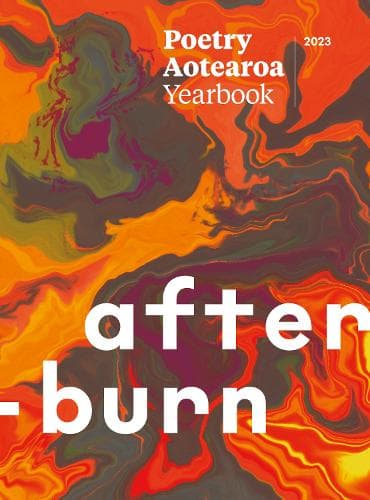Review: Poetry Aotearoa Yearbook 2023 - afterburn
Reviewed by Erica Stretton
Poetry Aotearoa Yearbook 2023: after-burn is a conflagration, the cover licking flames, the featured poet Tyla Harry Bidois giving no quarter in her poems of blood, stabbings, iron and pythons. Editor Tracey Slaughter notes that ‘a poem refuses to let us be shut down, locked out, cut off,’ and after-burn is filled to the brim with that sort of poetry.
Aotearoa’s longest-running poetry magazine has an updated title this year, to better reflect our heritage, diversity and ‘kaleidoscopic but tightly-woven core.’ Inside, the trusted format we know and love: ten poems and an interview with Bidois; 110 new poems by a selection of New Zealand’s finest poets, a mingling of experienced and emerging voices; an essay focusing on esteemed poet Michele Leggott; a discussion considering Out Here: An Anthology of Takatāpai and LGBTQIA+ Writers from Aotearoa and finally reviews of 29 poetry books published this year.
Bidois speaks of the need to ‘develop that narrative in writing honestly, as well as taking care of the reader’s welfare. Confronting things is wonderful…’ and confront things this poetry does. Mingling a modern voice with mythology, it seethes with violence and blood, and there’s no allowance for indecision or gentleness. In Darling (vi.) even laughter is a weapon:
‘though I like
to laugh, and what silliness it is, those clapping lungs,
so much nothing; the light, the light;
I think it injures monsters, this sound’
But the jewel in this book, the New Poems section, brings together many windows into the world. The poetry could be distilled to the perennial human fascinations: death, love, parenthood, climate, inequality. But that would be to ignore all the subtle distinctions and wry observations that give the words so much weight. Jane Arthur, in The Sky is Bigger, points out love’s changing patterns:
We tag-team bad moods, which
is my latest, most appreciative definition of romance.
Hana Pera Aoake speaks to her baby in a prose piece that encompasses so much, wanting a safe world where opportunities are equal:
‘I wish I could give you the world but I
was only given mud, rot and the bones of a half-eaten fish.’
And Khadro Mohamed, whose book We’re All Made of Lightning is shortlisted for the Mary and Peter Biggs Award for Poetry at the Ockham NZ Books Awards, shows how oneself is not only the individual:
every time I look in the mirror I don’t see myself:
I see all of the Indian Ocean…
Silenced voices come up many times, whether in death or in life, or the hand-over of the voice to the younger generation. Mark Broatch considers muteness directly; after musing on how speech is magic and its loss devastating, he concludes with the terrifying:
we christen a personality
bricked into a furious silence.
This is the writer’s worst nightmare. Tessa Keenan, in Oākura Beach, gives this another dimension: what if there’s nobody around to hear you?
There is nobody around really. Extinction
is the only thing on the beach.
Ella Cartwright considers the role of women on the battlefield and how they are not silenced but pushed into the cracks, determining the finer details and influencing the tales.
We are someone deciding
to write down that it was tulips
you were slain on.
In Leah Dodd’s poem, fake plastic whale heart, the adult is separated from their child, who has climbed into a plastic heart with limited space inside. She goes on to consider how each of us has a different world, experiences that are solely ours; and on reunification with her son, ‘telling me in his tiny voice that sometimes / we have to go into the heart alone.’
The essays are in stark opposition to each other: John Geraets’ in-depth consideration of Michele Leggott’s poetry career is heavy, academic in tone, diving into the detail, while the conversation between Shaynah Jackson and Heidi Rogers is alive with personal observations, heart, and the gut-punch realisations that Out Here gave them both. Rogers speaks of the ‘willingness to share stories of queerness as a disruptive, exhilarating and erotic force,’ which makes the book a triumph.
Poetry Aotearoa can also be considered a joy and a triumph. Filled with a massive quantity of voices speaking their truth, the book and its poems ‘call us to enter scene after scene,’ as Slaughter says. Through them, we do not have to ‘go into the heart alone’ but with the words of others alongside us.
Reviewed by Erica Stretton
